Alundra
Available on: PS1, PS3, PSP, PS Vita
The Nintendo 64's Ocarina of Time might have been right around the corner, but the PlayStation still got its very own Legend of Zelda game in the form of Alundra in 1997. This top-down adventure has so much in common with Nintendo's successful franchise that it quite easily could be mistaken for a Zelda entry itself. A silent protagonist, bombs and bows, a vast overworld with grand soundtrack, dungeons and massive bosses, bushes that hold cash and items, incredibly challenging puzzles - it's all here in bucket loads. Alundra himself has the ability to jump manually, which sets in motion plenty of platforming sequences that can render difficult due to the fixed viewpoint, but adds another element to the gameplay to set itself apart from the average 2D Zelda title.
Unlike Zelda at the time of release, Alundra emphasises a dark story that features characters full of personality, brought to life through an excellent translation. Don't let the vibrant and colourful graphics fool you; Alundra makes death a prominent theme, and it is in this mature storyline that the hero, as a Dreamwalker of the Elna clan, enters the dreams of the villagers of Inoa to save them from their nightmares. The burden is a heavy one for Alundra, who must try to rescue the citizens, whilst discovering the meaning behind his own nightly visions.
Made by developers that worked on the Mega Drive's Landstalker, Alundra is quite possibly the closest game to Zelda that isn't actually Zelda, and is undoubtedly one that demands checking out for any fan of the classic 2D entries. It is made all the more desiring thanks to the heavy plot element that isn't afraid to take a tragic route, witty and humorous characters, and the tough puzzles that can drive a player insane (seriously, there are some really hard trials in here). Unmissable for any Zelda fan.
- Az
Little Big Adventure 1 & 2
Available on: PC, PS1, iOS, Android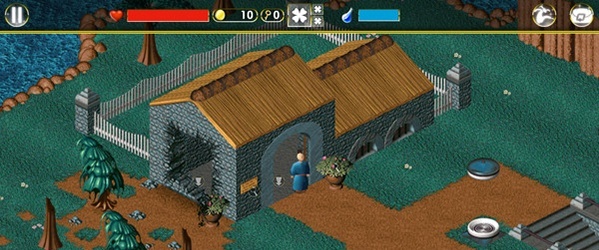
An open world to explore, full of interesting creatures and locations; a mix of combat and puzzles, many of which require items that unlock ways to progress; optional health upgrades hidden around the landscape - all of this from a creator that got a French "knighthood" in 2006 for his contributions to gaming.
It's safe to say the Little Big Adventure games have much of the same DNA as The Legend of Zelda. Gamers that love to explore and immerse themselves in a new world will be very much at home here. That's not to say the games are Zelda clones - far from it. The world, though filled with unique creatures and fantasy elements, is much more modern than Hyrule. The combat is also a bit slower paced, and normally focused on ranged attacks using the protagonist's surprisingly deadly bouncing ball.
Aesthetically, the games are a mix of isometric sprites and 3D, with the second game being an early example of full 3D landscapes. However, due to both games' age and pacing, they will likely appeal more to fans of classic 2D Zelda than fans purely of the 3D Zelda games.
The good news is both LBA games are very easy to get hold of, with GoG, DotEmu and Steam all selling them for very cheap. An enhanced mobile port of the first game even came out last year.
- Thomas
Oceanhorn: Monster of Uncharted Seas
Available on: PC, iOS
There is no hiding Oceanhorn's Wind Waker inspirations, as not only is the music and cartoony art style reminiscent of the 2002 GameCube title, but the seafaring theme and numerous islands that can be travelled to are right out of the same book. Sailing isn't quite the same as expected, with players setting a route to an island and the shortest path being automatically directed to by the game, albeit with hazards on the sea that must be avoided or shot down. As NPCs are spoken to, more islands will be learned of and added to the map for exploration.
Combat functions in much the same way as a Zelda title, with sword and shield the primary weapon set-up, and dungeons and puzzles run a common theme throughout, presented in top-down style. Oceanhorn doesn't quite match up to the quality of the iconic Zelda series itself, being an easy and simple affair for the majority of the game, but it is one that shouldn't go overlooked if craving anything resembling a Zelda adventure on PC or iOS systems.
- Az
Shadow of the Colossus
Available on: PS2, PS3
A sprawling open world, at the centre of which is an ancient castle. Inside, a young woman lies in eternal slumber on a stone slab, and a hero wielding a magic sword will go to any lengths to bring her back to life. While the similarities mostly end there, it's hard to deny Shadow of the Colossus has whispers of Zelda II - and other Zelda titles - running through its veins.
The Zelda series takes the cake as far as 3D action-puzzle games go, but Shadow of the Colossus stands out as the other side of the coin, favouring platforming over puzzles, while still implementing elements of both. Imagine a fantasy game about a young man riding his horse across a beautiful landscape, and you're bound to come up with either Link and Epona or Wander and Agro, and anyone who fought Morpheel and Argorok in Twilight Princess will probably admit Zelda took a little influence back from Shadow of the Colossus, too.
- David
3D Dot Game Heroes
Available on: PS3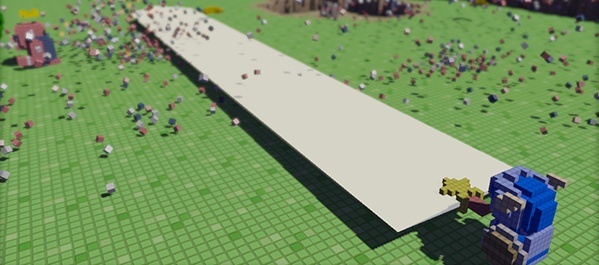
Homages to the very first Zelda title on the NES don't come any bigger and more obvious than with Silicon Studio's 3D Dot Game Heroes. Using the recently-popular voxel visual design, this 2D-styled game is set in a 3D world, playing out just like the original The Legend of Zelda, featuring references aplenty. Whilst Miyamoto's classic may be the core throwback, this also references and parodies so many other games from the NES period, including Dragon Quest and Mystic Quest/Final Fantasy Adventure, to quite hilarious effect, with jokes plastered throughout.
It's a typical "conquer the dungeons; save the princess" affair, and retains the tough difficulty titles from back then were known for, with some amusing gameplay elements worked into the mix, including expanding and widening the size of the sword when health is full, and beating enemies over the head with a book to add them to the bestiary. A smart little character creator is even built in, so players can create their own version of Link…or just about anyone and anything else they feel like "being" as the hero of the game. There is huge scope to design whatever, thanks to the voxel-based graphics, and really does encourage going silly, complementing the parodies dotted all over the game.
A seriously great, challenging and funny throwback that does itself justice as a NES-like adventure, and balances itself out with plenty of entertaining moments.
- Az
Beyond Good & Evil
Available on: PC, PS2, PS3, Xbox, X360, GC
If Little Big Adventure is for classic Zelda fans, maybe Beyond Good & Evil is for modern ones. Jet around a cluster of small islands, exploring, racing and doing a variety of stealthy missions. Reveal the truth, and take down a planet-wide conspiracy, stopping only to become a budding wildlife photographer along the way. In gameplay terms, it's like a condensed, faster paced Wind Waker. There's no grind - it keeps you interested at all moments, while packing in the charm and drawing you into its strange world.
Beyond Good & Evil is a classic that shows some of the best direction and pacing in video games. It is worth playing for the chase sequences alone.
- Thomas
The Binding of Isaac: Rebirth
Available on: PC, PS4, PS Vita, Xbox One, Wii U, New 3DS
Following the mighty success of Super Meat Boy, developer Ed McMillen hooked up with Florian Himsl to create a roguelike title that utilised aspects of the original Legend of Zelda on NES - namely those of top-down gameplay and dungeons influencing how the player would progress through the game.
In The Binding of Isaac, small four-by-four rooms lock the character Isaac in, where he must defeat enemies in a somewhat shooter style, firing his tears at them to unlock the next room. Weapons and items are found throughout, much like in Zelda titles, and they can be put to use to gain the upper hand. Experimentation is the key to learning how to survive in the randomly-generated dungeons, and deadly bosses wait on each floor. The core gameplay - and certainly its religious narrative and gruesome themes - are vastly different to typical Zelda, but the influences are obvious, and may just be enough to cause any classic Zelda fan to try this out on the numerous platforms it is available on.
- Az
Okami
Available on: PS2, PS3, Wii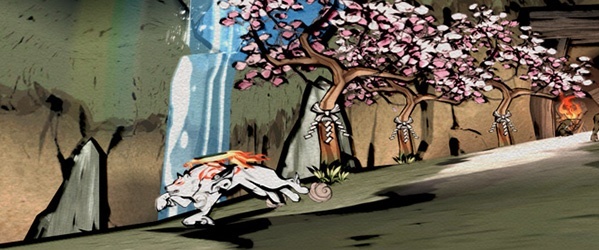
As Hyrule stands as a monument to the very struggles that Link undertook to preserve it so many times, Nippon, too, stands for one hero: Amaterasu. Okami tells the story of a wolf god and her quest to save her land from a malevolent force. She must travel through various dungeons, finding treasure and defeating forces that are poisoning the land. She accomplishes all of this through the use of a paint brush that allows her to alter the environment. While Okami may largely have its own identity, it clearly doesn't mind wearing its influences on its sleeve.
It's divisive, to say the least, to discuss Okami and The Legend of Zelda in the same conversation. On one hand, many gamers and critics alike have called Okami the "Zelda clone that outdid Zelda." On the other, many regard it as the ultimate homage to Link's numerous exploits, but, with its focus on painting and platforming, being a very different beast all together. From the charming characters Amaterasu meets, to the introductory marquee every boss fight gets, it's easy to understand the comparisons.
Of course, the easiest comparisons can be drawn between Okami and Twilight Princess. This, at least at surface value, is showcased through the wolf protagonist, but there is much more than that. Both of these classics feature sprawling landscapes filled with danger, treasure, and enough depth to keep the player engaged long after the main story has ended. Both games share similar ideas in relation to making the player feel like they are responsible for their own progression, without feeling like cardboard cut-outs of one another. Therefore, regardless of how any gamer feels about the adventure of the Great Sun God and her bouncing sidekick, one thing is all too evident: almost every inch of Okami is soaked with the influence of one young Hylian boy, and the land he is destined to save.
- Thom
Star Fox Adventures
Available on: GC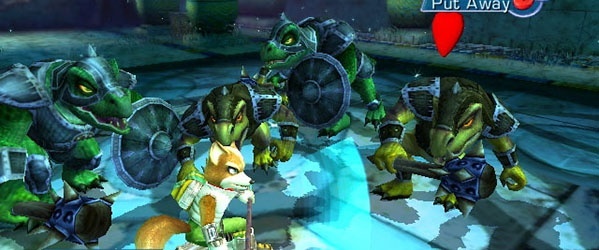
It may not be at the top of everyone's list, but there's no denying it: Star Fox Adventures is, almost to a T, a replica of 3D Zelda games. Most of everyone knows the history of this one - how it was initially in development for the N64, how it was never supposed to star Fox McCloud and pals, and how a huge portion of content was cut from the game in order to release on the GameCube before developer Rare's time was up with Nintendo - but clearly the N64 Zelda games played a massive part in the inspiration for it.
Without dwelling on the lost material, of which remnants have been dug up in the files of the game, Star Fox Adventures is a generally pretty easy affair, but one that made for a fair alternative 3D Zelda, with a control system that mirrored Link's titles, featured numerous puzzles, required Fox to travel the world - defeating giant bosses and collecting sacred stones and spirits in the process - and had an array of quirky characters that brought Dinosaur Planet to life. Fans of classic Star Fox titles will be pleased to know there are even a handful of surprisingly good Arwing space stages to complete when travelling to other locations. Star Fox Adventures certainly isn't without its flaws, but it's easily one of the most "3D Zelda" games out there, and is visually gorgeous to boot.
- Az
Golden Axe Warrior
Available on: Master System, PS3, X360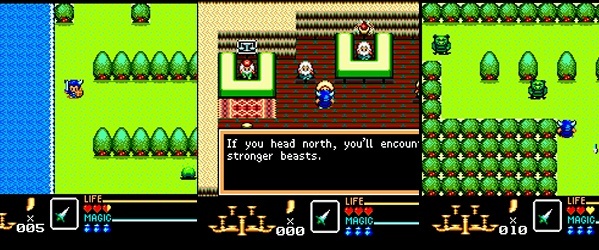
If a game could safely be given the title of "The Legend of Zelda's Shameless Rip-Off," that would surely be Golden Axe Warrior; an old and relatively unknown spin-off of the Golden Axe beat 'em up series, released for SEGA's Master System. Why shameless? Well, firstly, it was so frigging alike that it could be viewed as a reskin of the NES classic, and secondly, it had an extremely similar structure and objective, with Magic Crystals rather than Triforce pieces, a giant warlord instead of Ganon, and the eponymous Golden Axe in the place of the Silver Arrow and Magical Sword.
Despite being an almost exact copy, however, it was very enjoyable, since it made some subtle additions/changes. It offered more interactions with NPCs, a far more detailed world, and the ability to use spells. Other than these, though, it still remained an inferior game, partly because it was a bit lighter on the puzzling/adventuring, but mainly because it lacked that special charm, atmosphere and immersion, as well as the iconic audio-visuals of Link's first odyssey.
- Ofisil

 Sign In
Sign In 02.05.2016
02.05.2016  Ofisil
Ofisil 
 Link to this post:
Link to this post: 
 Subscribe to this topic
Subscribe to this topic Features
Features






 Top
Top

